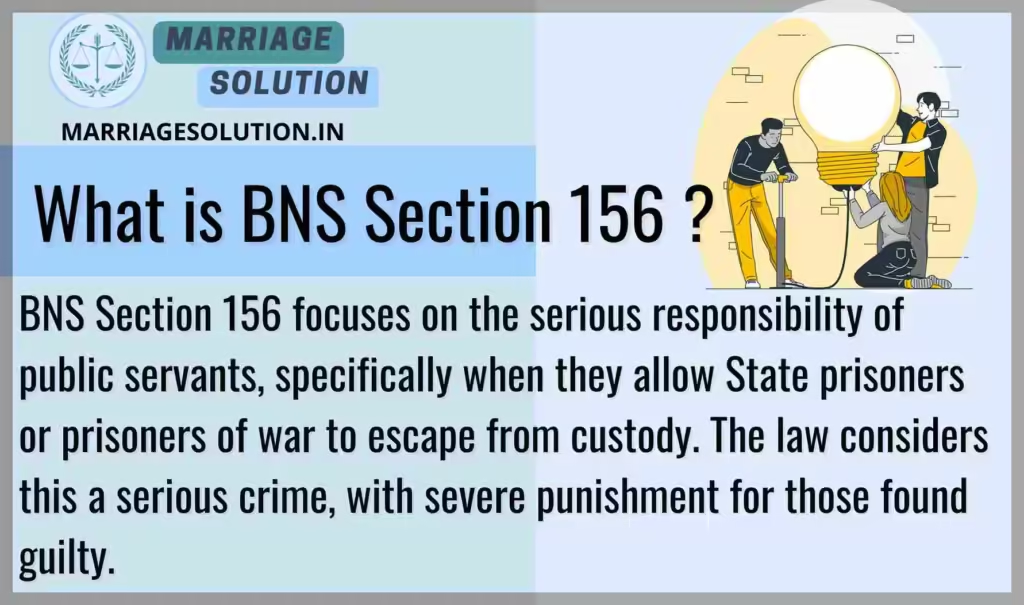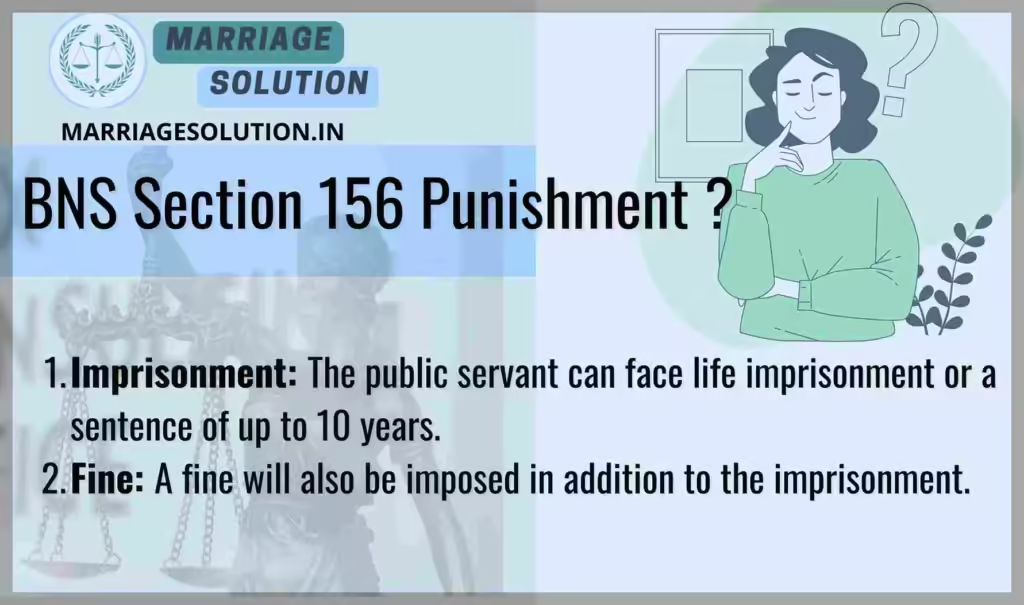Introduction of Section 156 BNS
Section 156 BNS deals with the serious offense of public servants deliberately allowing a State prisoner or a prisoner of war to escape from custody. Public servants are entrusted with the responsibility of ensuring that such high-risk prisoners remain confined under strict security. Any intentional act of permitting their escape is treated as a grave breach of duty and trust, threatening national security. The law imposes severe punishments, including life imprisonment or up to 10 years in jail along with a fine, making it one of the strictest provisions in the BNS.
The Bharatiya Nyaya Sanhita (BNS) Section 156 replaces the old Indian Penal Code (IPC) Section 128.
What is BNS Section 156 ?
BNS Section 156 focuses on the serious responsibility of public servants, specifically when they allow State prisoners or prisoners of war to escape from custody. The law considers this a serious crime, with severe punishment for those found guilty.

Under Section 156 of the bns act 2023
“Whoever, being a public servant and having the custody of any State prisoner or prisoner of war, voluntarily allows such prisoner to escape from custody, shall be punished with imprisonment for life, or with imprisonment which may extend to ten years, and shall also be liable to fine.”
Explanation in Simple Terms
- Who is Covered?
Applies only to public servants (police, jail staff, armed forces, etc.) who have custody of State prisoners or prisoners of war. - What is the Crime?
If such a public servant deliberately allows a prisoner to escape, it is treated as a grave betrayal of duty. - Why is it Serious?
Because it is not negligence—it is an intentional act that can endanger national security and public trust. - Punishment:
- Life imprisonment, or
- Up to 10 years imprisonment + fine
- Nature of Offense:
- Cognizable → Police can arrest without a warrant.
- Non-bailable → Bail is not easily granted.
- Non-compoundable → Cannot be settled privately.
- Tried by Court of Session → High-level trial due to seriousness.
Key Elements of Section 156
- Public Servant Duty – Applies to those in official custody roles.
- State & War Prisoners Covered – Focuses on prisoners who pose a risk to state security.
- Voluntary Escape – The act must be intentional, not accidental.
- Strict Punishment – Life imprisonment possible.
- Fine Imposed – Along with jail term.
- Cognizable – Quick police action allowed.
- Non-Bailable – Bail is not a right.
- Non-Compoundable – Cannot be settled outside court.
- Court of Session Trial – Heard in higher courts.
- Breach of Trust – Protects integrity of governance.
Why BNS Section 156 is Important
- Protects National Security → Ensures dangerous prisoners cannot escape and threaten India’s sovereignty.
- Maintains Public Trust → Citizens must trust that public servants will carry out their duties honestly.
- Deters Corruption → Prevents officers from taking bribes or misusing their authority.
- Strengthens Accountability → Holds public servants responsible for intentional misconduct.
- Ensures Rule of Law → Even high-ranking officials cannot compromise national safety.
Examples
- Example 1 – Bribery Escape:
A police officer accepts money to allow a prisoner of war to flee. → Punishable with life imprisonment or 10 years jail + fine. - Example 2 – Jail Superintendent Escape:
A jail official leaves a cell open, knowingly letting a State prisoner run away. → Punishable under Section 156.
Section 156 BNS Overview
BNS Section 156 focuses on situations where a public servant, responsible for guarding prisoners of war or state prisoners, intentionally allows them to escape. This is a serious offense that can lead to imprisonment and fines.
BNS Section 156 :10 Key Points
- Responsibility of Public Servants:
BNS Section 156 applies to public servants, such as police officers or jail staff, who are responsible for guarding prisoners of war or state. It means they have an important duty to make sure these prisoners do not escape. - Voluntarily Letting Prisoners Escape:
If a public servant, instead of doing their duty, deliberately lets a prisoner escape, they are committing a serious crime. This section covers situations where the escape is allowed on purpose. - Prisoners Covered:
This law focuses on prisoners of war and state prisoners. Prisoners of war are usually from conflicts or wars, and state prisoners are those arrested for crimes against the state. - Severe Penalties for Offense:
The punishment for letting a prisoner escape is very strict. If a public servant is found guilty, they could face life imprisonment or imprisonment for up to 10 years. - Additional Fine:
Along with the prison sentence, the public servant can also be fined. This fine is imposed as part of the punishment for betraying their duty. - Cognizable Offense:
This is considered a cognizable offense, meaning the police can arrest the public servant without needing a warrant. This makes it easier for the authorities to act quickly in such cases. - Non-Bailable Crime:
This offense is non-bailable. This means the person accused of the crime cannot easily get out on bail. They must remain in custody while the case is heard in court. - Tried in Court of Session:
Cases under BNS Section 156 are taken very seriously and are tried in the Court of Session, which is a higher court that handles major crimes. - Non-Compoundable Offense:
This crime cannot be settled outside the court or by agreement between the parties involved. The case must go through the legal process, and there is no chance of a compromise. - Serious Breach of Trust:
Allowing a prisoner to escape intentionally is seen as a serious betrayal of the trust placed in public servants. It endangers the safety and security of the country, which is why it carries such heavy punishments.
Examples of BNS Section 156
- Example 1: A Corrupt Officer Letting a Prisoner Escape
A police officer in charge of guarding a prisoner of war accepts a bribe from the prisoner’s friends and deliberately allows the prisoner to escape. Under BNS Section 156, this officer would face life imprisonment or up to 10 years in prison, along with a fine, for betraying their duty. - Example 2: Prison Escape Planned by a Jail Superintendent
A jail superintendent who has custody of a state prisoner agrees to help the prisoner escape by leaving a door unlocked. This act of purposely allowing the prisoner to escape is covered under BNS Section 156. The superintendent could be arrested without a warrant, face up to 10 years in prison, and be fined.
BNS 156 Punishment
Imprisonment: The public servant can face life imprisonment or a sentence of up to 10 years.
Fine: A fine will also be imposed in addition to the imprisonment.

156 BNS bailable or non bailable ?
No, BNS Section 156 is non-bailable, meaning the accused does not have the right to bail easily and must go through a more complex legal process to obtain it.
Comparison – BNS Section 156 vs IPC Section 222 (Old Law)
| Section | What it Means | Punishment | Bail | Cognizable? | Trial By |
|---|---|---|---|---|---|
| BNS Section 156 | Applies to public servants who intentionally allow a State prisoner or prisoner of war to escape from lawful custody. It targets deliberate breaches of duty that endanger national security and public trust. | Life imprisonment or imprisonment up to 10 years, and also liable to fine. | Non-bailable (bail not easily granted) | Cognizable (police can arrest without warrant) | Court of Session |
| IPC Section 222 (Old) | Applied to public servants who intentionally allow any prisoner lawfully confined to escape from custody. It covered all types of prisoners, not limited to State or war prisoners. | Imprisonment up to 7 years and fine. | Bailable in some cases | Generally cognizable | Court of Session |
BNS Section 156 FAQs
What does BNS Section 156 cover?
It covers public servants who intentionally allow prisoners of war or state to escape from custody.
What is the punishment under Section 156?
The punishment can be life imprisonment or up to 10 years in prison along with a fine.
Is BNS 156 offense bailable?
No, it is a non-bailable offense.
Conclusion
Section 156 of the BNS highlights the critical accountability of public servants in safeguarding national security. By punishing those who intentionally allow prisoners of war or State prisoners to escape, the law ensures that no compromise is made with the safety of the nation. The non-bailable, cognizable, and non-compoundable nature of the offense underscores its seriousness. With punishments ranging from 10 years to life imprisonment plus fines, the section acts as a powerful deterrent against corruption, negligence, and betrayal of duty.
Need Legal Support?
If you’re facing court proceedings, marriage-related issues, or any legal matter, our team at Marriage Solution – Lawyer Help is ready to guide you. Just complete our easy online enquiry form, and we’ll connect you with the right legal assistance tailored to your needs.
Finished with BNS 156 ? Continue exploring the next provisions of the Bharatiya Nyaya Sanhita (BNS), 2023. Each section includes explanations, examples, and plain-language breakdowns for easy understanding.
- 157 BNS : Public servant negligently suffering such prisoner to escape.
- https://marriagesolution.in/bns_section/157-bns/
- 158 BNS : Aiding escape of, rescuing or harbouring such prisoner.
- https://marriagesolution.in/bns_section/158-bns/
Chapter VIII – Of Offences Relating To The Army, Navy And Air Force
- 159 BNS : Abetting mutiny, or attempting to seduce a soldier, sailor or airman from his duty.
- https://marriagesolution.in/bns_section/159-bns/
- 160 BNS : Abetment of mutiny, if mutiny is committed in consequence thereof.
- https://marriagesolution.in/bns_section/160-bns/
- 161 BNS : Abetment of assault by soldier, sailor or airman on his superior officer, when in execution of his office.
- https://marriagesolution.in/bns_section/161-bns/
Full IPC Section List: https://marriagesolution.in/ipc-section-list
All Indian Law & Blogs: https://marriagesolution.in/indian-law/
Full BNSS Section List: https://marriagesolution.in/bnss_section-list
